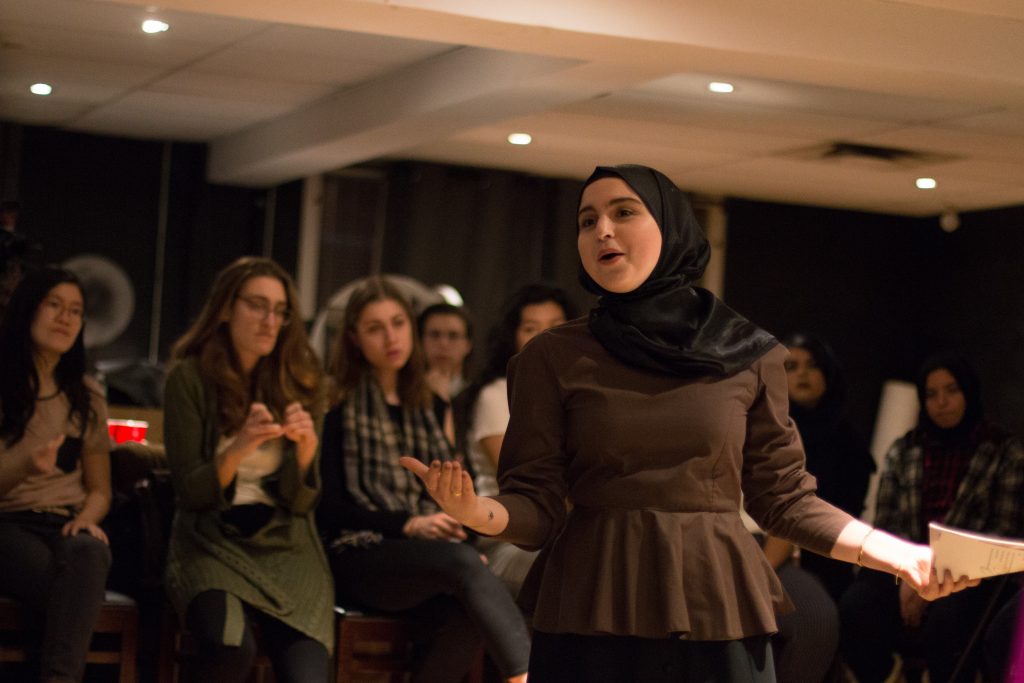Women step up and slam down at poetry night
By Jane Skrypnek
Each woman took her turn stepping out of the shadows and into the ring of twinkling lights to share her story.
Audience members seated on bar chairs circling the performer raised their fists and yelled, “Speak!” They snapped their fingers and called out encouragement as each female spoken word poet spoke up and slammed down.
The women’s-only spoken word poetry night, held March 6 at LIVE! on Elgin, was only the second of its kind and a nod to the #MeToo movement — an acknowledgment that now is the time for women’s voices to be heard.
“It’s such a direct tackle at issues, because we can just speak directly about what we’re feeling and what’s going on,” said King Kimbit, who co-organized the event with Urban Legends Poetry Collective. Kimbit said that together, they hope to give a platform to women to voice their experiences.
The night was divided into three parts: a spoken word open mic, the headlining performance, and a slam competition. Spoken word refers to the performative and emotive way the artist presents their poetry, while slam is the competitive form.
The open mic section was directed at newcomers wanting to share their experiences and test the stage. At the end of each piece, the audience cried, “Please come back!”
Then came the headliner, Barâa Arar. She’s an accomplished local poet and fourth-year humanities student at Carleton University.
Arar is also the daughter of Maher Arar, a high-profile victim of U.S. “rendition” policies, and Monia Mazigh, a well-known human rights activist and politician.
Maher Arar was the subject of an infamous Canadian legal case after he was wrongly accused of terrorism and mysteriously deported by American authorities to Syria, where he was tortured. After his return to Canada, he was exonerated by a commission of inquiry and eventually paid $10.5 million in compensation by the Canadian government.
Barâa Arar said that for her part, she prefers to keep her poetry separate from the story of her famous parents.
Arar said she first discovered spoken word at a summer camp talent show in 2010 and was captivated by her ability to convey emotions and make deep connections with audience members.
“You’re normally only able to build these connections after long friendships or relationships with people, but when you’re there performing a poem, you’ve created this intimate space,” Arar said.
This ability to connect, she explained, is what allows spoken word poetry to be such a powerful platform for marginalized voices.
“Because spoken word is so accessible, it means that it can become a channel for people, especially women, especially underrepresented voices, to say this is my story and this is how I choose to say it, and be kind of unapologetic about that,” she said.
Arar performed multiple pieces focusing on womanhood, and particularly on how women’s stories have been ignored throughout history.
“Women, just like anyone, don’t need to do extraordinary, incredible things to be worthy,” she said.
Arar left the stage to thundering applause, allowing the slam competitors to take their turns.
The winner of the night was a competitor named Blue, who walked away with a perfect score. “It is my belief that the easiest way to communicate directly and honestly with other people is all about the delivery,” Blue said.

The poetry collective plans to send Blue to the Women of the World Poetry Slam in Dallas, Texas next year.
Arar, like Blue, said it is the delivery of spoken word that brings women’s issues down to a relatable level.
“When you have someone up there telling their story, saying this is how I’m hurting, this is my experience, someone can understand that really easily,” Arar said.
“And that’s what spoken word is,” she added. “It’s a testament of humanity. It’s a three-minute or five-minute connection with people to show this matters to me, I’m here to stay, this is my story.”
Kimbit said organizers plan to hold more women’s slam nights in the future.

